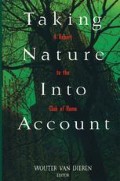Abstract
On first hearing, “sustainable development” sounds difficult—and certainly achieving sustainability looks to be one of the toughest challenges our species has ever faced. But the significance of this term is simple to sum up: it indicates a switch in environmental thinking from a necessary early obsession with emerging problems to a growing interest in environmental solutions which will be economically, socially, and politically viable. Sustainable development also potentially permits a much wider range of interests (environmental, social, political, economic, commercial) to make common cause. However, there are very different views on what the end-point of this process should be, what it will involve, who is responsible for initiating and guiding it, and how fast it should go.
Access this chapter
Tax calculation will be finalised at checkout
Purchases are for personal use only
Preview
Unable to display preview. Download preview PDF.
References
Asian Development Bank (1993), Economic Policies for Sustainable Development.
Commission of the European Communities (1992), Towards Sustainability. The Fifth Environmental Action Programme.
Confederation of Indian Industry / United Nations Development Programme / Business Council for Sustainable Development (1992). Changing Course: Towards Sustainable Development—An Indian Industry Perspective, New Delhi, India.
Dobson, A. (ed.) (1991), The Green Reader, Andre Deutsch, London, pp. 242–247.
Dunlap, R.E., G.H. Gallup, and A.M. Gallup (May 1992), The Health of the Planet Survey: A Preliminary Report on Attitudes to the Environment and Economic Growth Measured by Surveys of Citizens in 22 Nations, The George H. Gallup International Institute, Princeton, New Jersey, USA.
Elkington, J., and A. Dimmock (1992), The Corporate Environmentalists: Selling Sustainable Development—But Can They Deliver?, SustainAbility I.Td, London.
Elkington. J. and N. Robins (1994), The UNEP Corporate Environmental Reporting Guide, United Nations Environment Program Industry & Environment Program Activity Center (1E/OAC), Paris. France.
Fornander. K. (1991), “Japan Inc Gets into the Environment Business,” Tomorrow, Vol. 1. No. 1, pp 38–43
Hanneberg. P, (1991). “The Seychelles Conservation Keeps the Tourists Coming.” Tomorrow. Vol. 1, No. 1, pp 24–37.
Hawken, P. (1993). The Ecology of Commerce: A Declaration of Sustainability, HarperCollins, New York.
International Institute for Sustainable Development (1992), Sourcebook on Sustainable Development, Manitoba, Canada.
IUCN, IJNEP, and WWF (1980), World Conservation Strategy: Living Resource Conservation for Sustainable Development,.
IUCN, UNEP, and WWF (October 1991), Caring for the Earth: A Strategy for Sustainable Living, Gland, Switzerland.
MacNeill, J. (1990), “Meeting the Growth Imperative for the 21st Century,” in Sustaining Earth: Response to the Environmental Threats, Angell, D.J.R., et al., Macmillan, London, pp. 191–205.
Meadows, D., et al. (1992), Beyond the Limits: Confronting Global Collapse, Envisioning a Sustainable Future, Earthscan.
Netherlands, To Choose or to Lose: The National Environmental Policy Plan (¡SEPP), 1989; NEPP-Plus, 1991; NEPP-2, 1994..
Pcarec, D., et al. (1994). Blueprint Measuring Sustainable Development, Earthscan, London.
Pezzey, J. (1989), Definitions of Sustainability, CEED Discussion Paper No. 9, The UK Centre for Economic and Environmental Development. Cambridge.
Rosenberg, A.J. et al. (1993), “Achieving Sustainable Use of Renewable Resources,” Science, Vol. 262 (5 November), pp. 828–829.
Solow, R. (1974), “The economics of resources or the resources of economics,” American Economic Review (May): 1–14.
Solow, R. (1992), An almost practical step toward sustainability, Resources for the Future (40th Anniversary Lecture), Washington, DC.
State Information Service (December 1988), Environment and Development: Dye Danish Government s Action Plan, Copenhagen, Denmark.
Sustainability (1993a), Coming Clean: Corporate Environmental Reporting,, London, UK, with Deloitte Touche Tohmatsu International and the International Institute for Sustainable Development.
Sustainability (1993b), The LCA Sourcebook: A European Business Guide to Life-Cycle Assessment, London, UK, with the Society for the Promotion of I.CA Development (SPOID) and Business in the Environment (BiE).
Swedish Environmental Protection Agency (1993). Strategy for Sustainable Development, Solna, Sweden.
Timberlake, L, “What is Sustainability,” in Green Pages: The Business of Saving the World, Elkington J., J. Hailes, and T. Burke (eds.) (1988). Routledge, London, pp. 50–51.
United Kingdom. This Common Inheritance: Britain’s Environmental Strategy, 1990, First Year Report, 1991; Second Year Book, 1992, and Dye UK Strategy for Sustainable Development, 1994.
Williams. M.J. and P L Petesch (September 1993), Sustaining the Earth: Role of Multilateral Development Institutions, The Network, Center for Our Common Future. Geneva, p. 3.
World Bank (1993), The World Bank and the Environment: Fiscal 1993, Washington D C.
World Commission on Environment and Development (1989), Our Common Future, Oxford University Press.
World Resources Institute, The Brookings Institution and the Sante Fe Institute (May 1993), The 2050 Project: Transition to Sustainability in the Next Century, (10–93.DSC).
Worldwatch Institute (1994), State of the World 1994, A Worldwatch Institute Report on Progress Towards a Sustainable Society, W.W. Nonon, New York.
Editor information
Rights and permissions
Copyright information
© 1995 Springer-Verlag New York, Inc.
About this chapter
Cite this chapter
Van Dieren, W. (1995). From Growth to Sustainability. In: Van Dieren, W. (eds) Taking Nature Into Account. Springer, New York, NY. https://doi.org/10.1007/978-1-4612-4246-8_6
Download citation
DOI: https://doi.org/10.1007/978-1-4612-4246-8_6
Publisher Name: Springer, New York, NY
Print ISBN: 978-0-387-94533-0
Online ISBN: 978-1-4612-4246-8
eBook Packages: Springer Book Archive

